A battleground of change: Role of DU in social movements
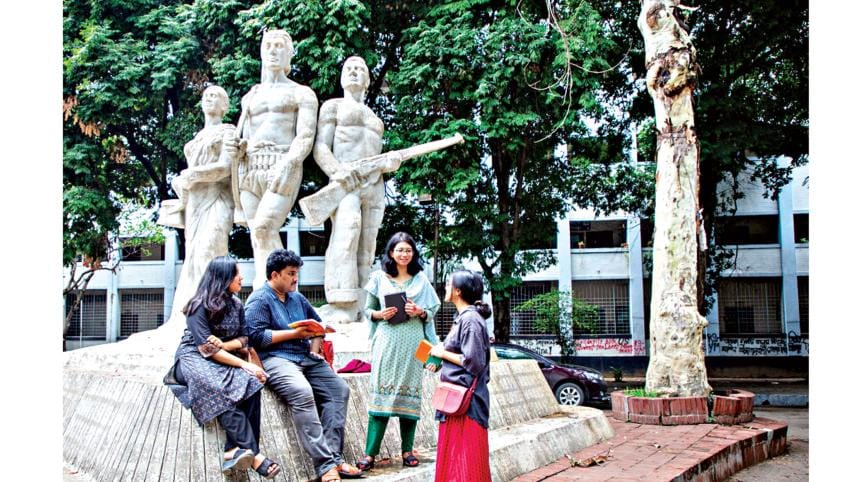
The pulsating energy of Dhaka University campus works as a catalyst to inspire students and shape their conscience.
For a student, the university days are the prime of their lives when they discover themselves, free from adult supervision. Their thought process is moulded by stimulating discussions and lectures of eminent minds of the society. They become politically charged and are able to debate and express their thoughts on an intellectual topic with faculty, they read books suggested by professors, attend poetry reading sessions, interact freely with friends in the library, share a cup of tea at Hakim Chattar and most importantly, they fall in love.
They fall in love with the ambience and energy of the campus that sets afire a series of metamorphosis within themselves; the power of expressing free will and open-mindedness. They begin to appreciate the freedom of speech and finally feel that they belong to a community.
However, for most of the last 15 years, this charm of Dhaka University was almost lost, said many former and present students.
They said the ruling party's student wing, the Chhatra League, occupied all the dormitories and controlled the intellectual sphere of the campus, calling the shots in every aspect. They swooped down on anyone who dared to protest against them, suffocating the spirit of free debate and independence that once defined the university.
The dormitories became fortresses for BCL, where dissent was crushed, and fear reigned, while general students endured unimaginable living conditions -- 20 to 25 freshers crammed into rooms meant for no more than four, with some even relegated to sleeping on balconies. These overcrowded spaces became notoriously known as "gonorooms".
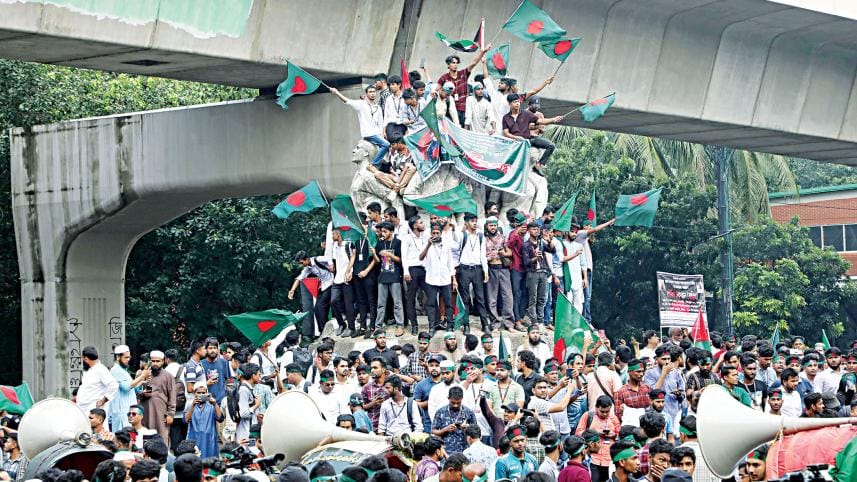
The only way to escape this fate was by joining BCL politics, actively participating in all their programmes, and proving loyalty over the course of a year. Only then, with a political recommendation, could students hope to secure a proper room.
Despite this culture of repression, Dhaka University students sporadically revolted. Movements like the 2018 quota reform and the road safety protests saw brief flashes of defiance against the BCL goons. Yet, the shadow of fear loomed large, and the BCL's dominance remained largely unchallenged.
That changed in 2024. During the quota reform protest, Dhaka University students broke this culture of fear.
This time, when the BCL attacked protesters on July 15, the students didn't hide or run. Instead, they united, armed themselves with sticks, and resisted the terror together.
They refused to bow down, standing tall in the face of violence. From the night of July 16 to July 17 morning, a remarkable shift took place -- general students liberated all the dormitories from the BCL's grasp.
Their revolt did not stop there. When students were forced to leave their dormitories in face of firing from law enforcers on July 17, the uprising spread across the country, culminating in a powerful movement that ultimately toppled the Awami League regime and forced Sheikh Hasina to flee.
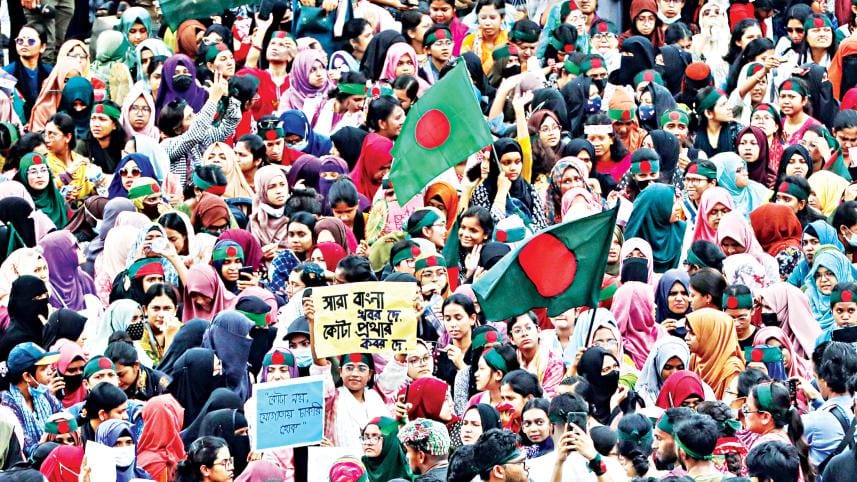
What had started as a protest turned into a revolution. Since Sheikh Hasina's resignation on August 5, Dhaka University students continued to step up whenever needed, exemplified by the student-led relief efforts for flood victims, supporting the injured during anti-government protests, and standing by the families of those killed during the mass uprising.
Mohammad Tanzimuddin Khan, a professor at the department of International Relations in Dhaka University, earlier told this newspaper, "For the past 16 years, we have seen these kinds of initiatives be limited to the government's student organisations. But before that, during any crisis, we used to see collective participation from everyone. It seems that we have returned to that place," he said.
This is the beauty of DU, where, in times of national crisis, everyone ensures their participation equally to overcome it, he added.
LEGACY OF DU
Dhaka University is a historical ground that has served as a stimulus for social movements and political revolutions in Bangladesh for over 75 years. The lush campus is filled with symbols of our nation's struggle for freedom and justice. And as a student, constantly walking past iconic landmarks like Oporajeyo Bangla, the Shaheed Minar, or Modhur Canteen, it leaves a lasting impact and shapes their thought processes almost spontaneously.
"Being surrounded by these historical sites and knowing that distinguished alumni have walked the same grounds, one can't help but feel a profound connection to the past. The atmosphere here is incredibly motivating; it pushes us to contribute to the ongoing journey of our nation, instilling a sense of duty to uphold the values of freedom, justice, and unity," said Momena Islam, a former student.
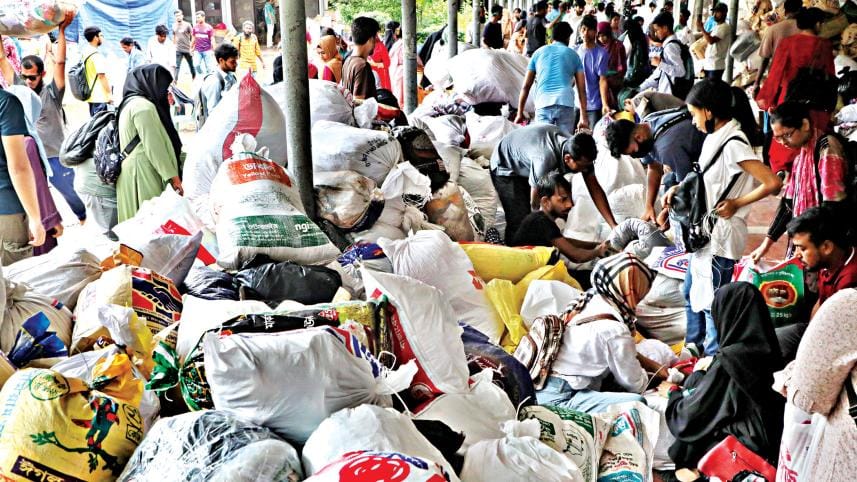
"The university's legacy of dissent against the government, the system, or oppression has shown me -- and countless others -- the incredible strength of student unity and leadership. Our collective efforts have demonstrated time and again that when students of public university rise, they can shape the future of an entire nation," she added.
The university's rich history of resistance and protest dates back to the Language Movement of 1952, which was pivotal in asserting our cultural and linguistic identity against oppressive forces. DU students stood at the forefront of the 1969 mass uprising and many of us took inspiration from the courage of those who came before us. The Liberation War of 1971 is the testament to DU's critical role in the nation's history.
Over the years, whether resisting military rule, challenging authoritarian practices, standing up for the underprivileged, uniting for disaster management, or organising cultural activities, DU has consistently been a catalyst for change. The common factor in all of these uprising is the presence of students.
"For a student from a mufassil town such exposure and sense of belonging creates riots in their mindset and they begin to think independently. And if they meet with an obstacle to express their opinions and are pressurised beyond a certain point, these ordinary students take part in political movements that you witness. Only students can set in motion a revolution because they have no strings attached to them," said a 90's student who was actively involved in student politics during the anti-Ershad movement.
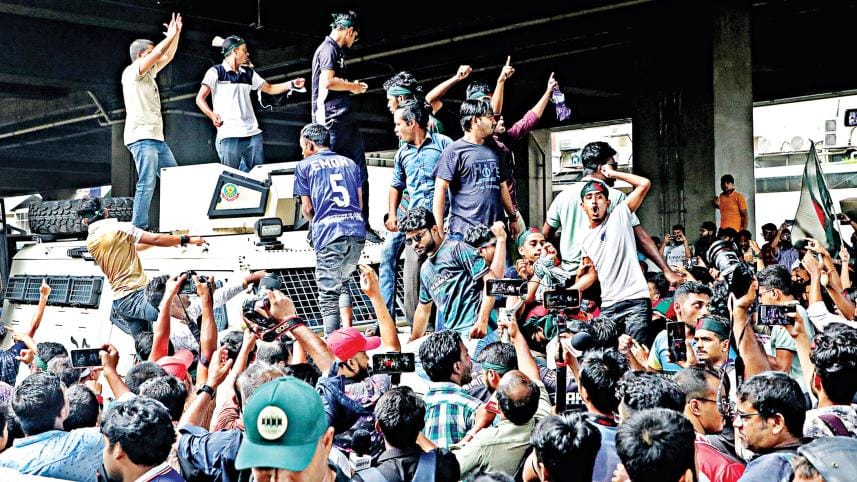
The crème de la crème of the students goes to medical and engineering schools, the mid-level meritorious girls and boys go to public universities and their first preference is always DU and JU (Jahangirnagar University). The socio-economic status of DU and JU students, mainly from the lower and middle-class strata, have made them deal with hard reality and struggles of life. For them, there is a real need for employment after the completion of education. The recent movement was aligned with jobs they need and has thus risen absolutely from the crisis of complexity for their living standard and need for salaried jobs," explained Dr Sowmit Joydip, assistant professor, School of General Education, BRAC University.
The energy reverberating the campus grounds, the corridors and dormitories is contagious; their identity as university students, their sense of belongingness to the campus, their youthful vigour, all these give momentum to challenge anyone in office who obstructs them.
"Their spirit spills over to private university students as a sort of proud fellow feeling. While public universities have safe campus spaces to bring out processions and give slogans, the private students take the sparks to the streets because of space constraints. This time, the long stretch of busy roads from Rampura to Uttara was occupied by student from private universities changing the force of the movement to gono andolon or mass uprising. Then the volley of mistakes and repression by the people in power has resulted in what we see today," said Joydip.
An ex-student involved in active politics added, "I am not against student politics, but it must be within the boundary of the campus. But that is an ideal picture. The truth of the matter is that they are used by politicians. They begin to fall for power, freedom, money and hero idolisation by peers. When money gets involved in politics, then the students become bigheads. But not all gets derailed..."
DU in its own exciting and stimulating tempo has shaped the political milieu of Bangladesh time and again.
And it seems now that Dhaka University has rediscovered its lost spirit, reclaiming its legacy as the heart of student activism and a beacon of hope during national crises. The students' defiance of fear, coupled with their efforts to bring change, has reignited the once-dimmed flame of Dhaka University's past glory.





 For all latest news, follow The Daily Star's Google News channel.
For all latest news, follow The Daily Star's Google News channel.
Comments